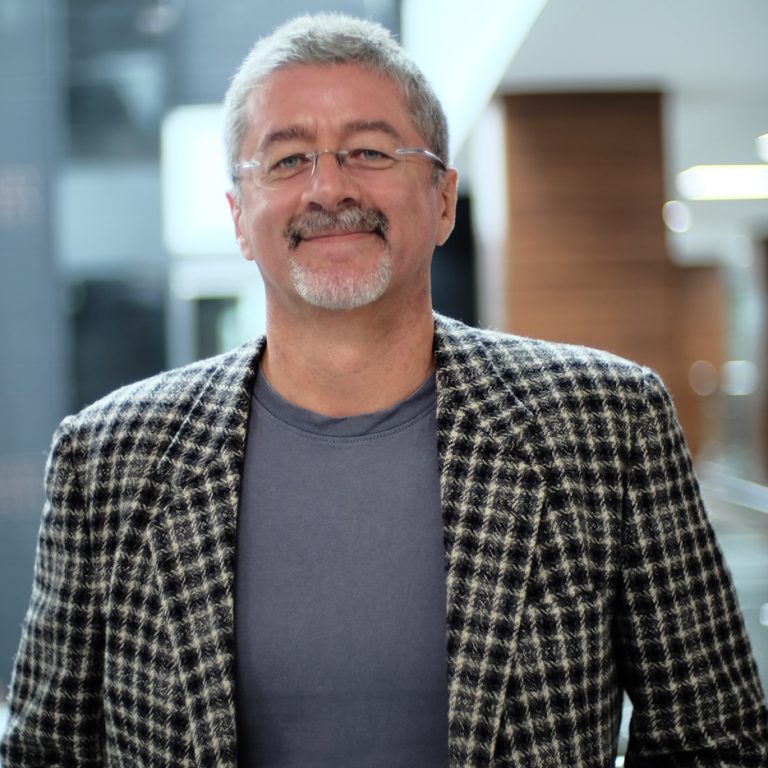
Научный интерес
Recombinant protein engineering, expression, characterization and delivery; HIV-1 inhibition; tumor immunology; commensal bacteria engineering as live therapeutics.
Биография
Избранные публикации
In 1993, Dr. Luca Vangelista obtained his Italian Laurea in Chemistry and Pharmaceutical Technology at the University of Padua. In 1999, he obtained his PhD in Molecular Biology at the University of Heidelberg, for his PhD work (1994-1998) at the Structural Biology Program of the European Molecular Biology Laboratory headquarters in Heidelberg, Germany. Then he moved (from 1998 to 2002) as Postdoctoral Fellow at the Molecular Immunology Group of the International Centre for Genetic Engineering and Biotechnology in Trieste, Italy.
From 2003 to 2007, Dr. Vangelista was in Milan (Italy) as Research Scientist at the San Raffaele Scientific Institute and the University of Milan. In 2008, he created and directed the Protein Engineering and Therapeutics Group at the San Raffaele Scientific Institute, position that he held until his arrival at the Nazarbayev University School of Medicine in January 2015.
After his Laurea thesis on tetanus toxin, Dr. Vangelista worked on many proteins of therapeutic interest (CFTR, the giant muscle protein titin, IgE, allergens, Fc receptors, membrane immunoglobulins, CCL5/RANTES and CCR5) through a pilgrimage on a number of world class laboratories such as those mentioned above but also short visits at the GSK research headquarters in UK (1994, under a EU postgraduate program), the University of Vienna (1996, under an EMBO Short Term Fellowship), Sanquin Research in Amsterdam (2005, under an EFIS Short Term Fellowship) and Osel in Silicon Valley (2006, within a NIH grant network).
Over the years, Dr. Vangelista acquired and developed knowledge and skills in several biomedical and basic science areas such as Biochemistry, Molecular, Structural and Cellular Biology, Biocomputing, Microbiology, Immunology and Virology. His major field of expertise is Recombinant Protein Design, Engineering, Expression Systems and Purification. He succeeded in obtaining competitive grants from major international agencies such as the NIH and the EU but also from the Italian Ministry of Health. He authored 36 international peer review articles, 5 reviews, 3 book chapters, he is inventor in 2 patents and reviewer for several international journals and grant agencies. He has been a speaker at several international congresses and delivered several lectures to undergraduate and graduate students.
Research interests
Dr. Vangelista research deals with the development of CCL5/RANTES-based HIV-1 entry inhibitors, IgE as anti-tumor agent and the engineering of commensal bacteria for the delivery of therapeutic proteins in vivo. Current and future research by Dr. Vangelista spans Protein Engineering, Molecular Biology, Biochemistry, Immunology and Microbiology, reflecting the integrated approach adopted to address his goals.
The main focus of his recent research has been the development of innovative preventive strategies (topic microbicides) to fight HIV-1 infection, with the design, production and characterization of CCL5 derivatives acting as CCR5 antagonists and potent HIV-1 blockers. CCL5 antagonism towards CCR5 is an important requisite, as receptor activation could lead to pro-inflammatory conditions that might even favor enhancement of HIV-1 transmission. Moreover, CCL5-based CCR5 antagonists are likely to promote anti-inflammatory effects, widening their therapeutic window. Working on two fronts: CCL5-derived short peptides and full-length mutants, peptides have been developed that present blocking activity towards HIV-1 comparable to T20 (a peptide-based anti-HIV-1 drug) and Maraviroc (an anti-HIV-1 small chemical CCR5 antagonist drug), providing the proof of principle for a CCR5-targeting peptide drug approach. CCL5 full-length mutants were produced by engineering a human vaginal lactobacillus strain. With the secretion of active wild type CCL5 and a CCR5-antagonist mutant by recombinant lactobacilli, the principle for an anti-HIV-1 live microbicide was proved. Conceptually novel CCL5 mutants were then engineered in lactobacilli, used as a recombinant production/screening/preclinical development platform. This project led to the design and selection of CCL5 mutants with unprecedented anti-HIV-1 activity. The most potent CCR5 antagonist presented a 5 pM IC50 towards HIV-1BaL in acute infection assays. Following this achievement, strategies were successfully implemented to further modify this CCL5 mutant and enter the IC50 femtomolar scape. In tight relation to the above, Dr. Vangelista collaborates on the structural characterization of CCR5 and its interaction with anti-HIV-1 compounds. Moreover, an extensive survey on CCL5-derived peptide and, separately, full-length mutant combinations with an array of different HIV-1 inhibitors, highlighted a full suitability for the implementation of anti-HIV-1 cocktails.
Beyond HIV-1 blockade, the potent CCR5 agonist and antagonist CCL5 variants produced in the group of Dr. Vangelista are being planned for their testing in therapeutic landscapes from inflammation to multiple sclerosis and cancer. A portion of Dr. Vangelista future research will focus also on the expansion of the in vivo and in situ delivery of therapeutic proteins by engineered commensal bacteria for the development of vaccines and inhibitors of diseases of worldwide concern. Finally, preclinical research on the targeting of tumors with IgE will be continued and possibly taken to the clinics.
1. Vangelista L, Laffer S, Turek R, Grönlund H, Sperr WR, Valent P, Pastore A, Valenta R. The immunoglobulin-like modules C epsilon 3 and alpha 2 are the minimal units necessary for human IgE-Fc epsilon RI interaction. J. Clin. Invest. 1999. 103:1571-8.
2. Vangelista L, Cesco-Gaspere M, Lamba D, Burrone O. Efficient folding of the Fc epsilon RI alpha-chain membrane-proximal domain D2 depends on the presence of the N-terminal domain D1. J. Mol. Biol. 2002. 322:815-25.
3. Vangelista L. Current progress in the understanding of IgE-Fc epsilon RI interaction. Int. Arch. Allergy Immunol. 2003. 131:222-33.
4. Vangelista L, Soprana E, Cesco-Gaspere M, Mandiola P, Di Lullo G, Fucci RN, Codazzi F, Palini A, Paganelli G, Burrone OR, Siccardi AG. Membrane IgE binds and activates Fc epsilon RI in an antigen-independent manner. J. Immunol. 2005. 174:5602-11.
5. Vangelista L, Secchi M, Lusso P. Rational design of novel HIV-1 entry inhibitors by RANTES engineering. Vaccine 2008. 26:3008-15.
6. Nigro EA, Brini AT, Soprana E, Ambrosi D, Dombrowicz D, Siccardi AG, Vangelista L. Anti-tumor IgE adjuvanticity: key role of Fc epsilon RI. J. Immunol. 2009. 183:4530-6.
7. Vangelista L, Secchi M, Liu X, Bachi A, Jia L, Xu Q, Lusso P. Engineering of Lactobacillus jensenii to secrete RANTES and a CCR5 antagonist analogue as live HIV-1 blockers. Antimicrob. Agents Chemother. 2010. 54:2994-3001.
8. Nigro EA, Soprana E, Brini AT, Ambrosi A, Yenagi VA, Dombrowicz D, Siccardi AG, Vangelista L. An antitumor cellular vaccine based on a mini-membrane IgE. J. Immunol. 2012. 188:103-10.
9. Secchi M, Longhi R, Vassena L, Sironi F, Grzesiek S, Lusso P, Vangelista L. Enhancement of anti-HIV-1 activity by hot spot evolution of RANTES-derived peptides. Chem. Biol. 2012. 19:1579-88.
10. Secchi M, Vassena L, Morin S, Schols D, Vangelista L. Combination of the CCL5-derived peptide R4.0 with different HIV-1 blockers reveals wide target compatibility and synergic cobinding to CCR5. Antimicrob. Agents Chemother. 2014. 58:6215-23.
11. Nigro EA, Brini AT, Yenagi VA, Ferreira LM, Achatz-Straussberger G, Ambrosi A, Sanvito F, Soprana E, van Anken E, Achatz G, Siccardi AG, Vangelista L. Cutting Edge: IgE plays an active role in tumor immune-surveillance in mice. J. Immunol. 2016. 197:2583-88.
12. Jensen-Jarolim E, Bax HJ, Bianchini R, Capron M, Corrigan C, Castells M, Dombrowicz D, Daniels-Wells TR, Fazekas J, Fiebiger E, Gatault S, Gould HJ, Janda J, Josephs DH, Karagiannis P, Levi-Schaffer F, Meshcheryakova A, Mechtcheriakova D, Mekori Y, Mungenast F, Nigro EA, Penichet ML, Redegeld F, Saul L, Singer J, Spicer JF, Siccardi AG, Spillner E, Turner MC, Untersmayr E, Vangelista L, Karagiannis SN. AllergoOncology — the impact of allergy in oncology: EAACI position paper. Allergy 2017.72:866-887. (Journal Cover)
13. Jensen-Jarolim E, Bax HJ, Bianchini R, Crescioli S, Daniels-Wells TR, Dombrowicz D, Fiebiger E, Gould HJ, Irshad S, Janda J, Josephs DH, Levi-Schaffer F, O´Mahony L, Pellizzari G, Penichet ML, Redegeld F, Roth-Walter F, Singer J, Untersmayr E, Vangelista L, Karagiannis SN. AllergoOncology — opposite outcomes of immune tolerance in allergy and cancer: EAACI position paper. Allergy 2018. 73:328-340
14. Vangelista L, Vento S. The expanding therapeutic perspective of CCR5 blockade. Front. Immunol. 2018. 8:1981.
15. Secchi M, Grampa V, Vangelista L. Rational CCL5 mutagenesis integration in a lactobacilli platform generates extremely potent HIV-1 blockers. Sci. Rep. 2018. 8:1890.
16. Untersmayr E, Bax HJ, Bergmann C, Bianchini R, Cozen W, Gould HJ, Hartmann K, Josephs DH, Levi-Schaffer F, Penichet ML, O’Mahony L, Poli A, Redegeld FA, Roth-Walter F, Turner MC, Vangelista L, Karagiannis SN, Jensen-Jarolim E. AllergoOncology — microbiota in allergy and cancer: EAACI position paper. Allergy. 2019. 74:1037-1051.
17. Sypabekova M, Korganbayev S, González-Vila Á, Caucheteur C, Shaimerdenova M, Ayupova T, Bekmurzayeva A, Vangelista L, Tosi D. Functionalized etched tilted fiber Bragg grating aptasensor for label-free protein detection. Biosens Bioelectron. 2019. 146:111765.
18. Vangelista L, Secchi M. Prepare for the future: dissecting the spike to seek broadly neutralizing antibodies and universal vaccine for pandemic coronaviruses. Front. Mol. Biosci. 2020. 7:226.



